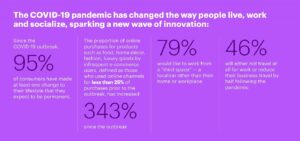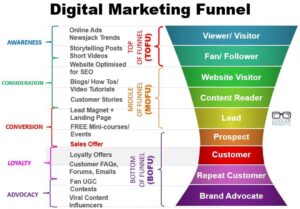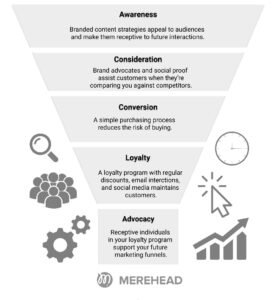Since its inception in 1898 by E. St. Elmo Lewis, the marketing funnel has undergone numerous iterations. Even though technology and consumer habits have evolved tremendously in the last century, the marketing funnel hasn’t changed too significantly.
The fundamentals of the marketing funnel remain the same, but the most effective tools and strategies for implementing them have progressed.
Using a marketing funnel allows you to visualize the customer journey and understand how customers become paying clients. Additionally, the funnel has grown to include additional stages like retention and advocacy, which are not included in the original four main stages.
Source: https://merehead.com/blog/latest-seo-trends-can-kill-business-ignore-2022/
Marketing funnels are different from sales funnels in that they aim to raise brand awareness and promote your product or service to potential customers. In contrast, the goal of a sales funnel is to convert prospects into customers.
There are plenty of reasons why you need a marketing funnel, let’s dive in!
Reason 1 – It helps you Consider each Stage of the Customer Journey
Customers at each stage of the marketing funnel have different requirements. If you have a strategy for each phase, you can manage every piece of content, each social post, or email campaign to ensure it is tailored for the funnel.
For example, you can ask how your marketing efforts help the audience at each stage. Somebody at the awareness stage has completely different needs to a brand advocate. There would be no value telling an advocate what your business does as they already know.
If you are at the awareness stage and trying to attract leads, you might utilize search ads like Google and Bing or social ads like Facebook and Instagram. Google reports that every $1 spent on Google Ads earns businesses an average revenue of $2.
Once prospects click through to your landing page from an ad and move to the consideration stage (typically takes 3 to 5 pieces of content), blog posts can engage them further and provide more valuable information.
By visualizing the marketing funnel, you can understand the type of content needed at each stage.
Reason 2 – Consumer Behavior Shifts
 Full-funnel marketing is crucial now that the COVID-19 pandemic has dramatically changed customer behavior. Because of economic pressures, store closures, or shifting priorities, more than 60% of consumers changed their shopping habits, with a third switching to a different brand.
Full-funnel marketing is crucial now that the COVID-19 pandemic has dramatically changed customer behavior. Because of economic pressures, store closures, or shifting priorities, more than 60% of consumers changed their shopping habits, with a third switching to a different brand.
According to data, many customers now cite a brand’s mission as a primary reason for purchasing. Marketers now have a wealth of data to understand better their customers’ wants and needs and how they make decisions throughout the entire funnel, allowing them to win new customers and keep existing ones loyal.
https://newsroom.accenture.com/news/covid-19-has-sparked-a-new-wave-of-innovation-across-consumer-industries-according-to-accenture-research.htm
Reason 3 – The Marketing Funnel Maximizes the Customer Lifetime Value
 People who have already purchased from you are also likely to be your most valuable customers. Your customers are more likely to return if they had a positive experience with your company the first time around.
People who have already purchased from you are also likely to be your most valuable customers. Your customers are more likely to return if they had a positive experience with your company the first time around.
Customers who have already purchased from you need a system that is tailored to their specific needs. Let’s take a practical example.
Imagine John buys a shirt and, upon doing so, sees a list of other products that he may like to buy. However, at the time, he is not ready to make another purchase. In three of six months, John could decide that he is prepared to buy the shoes or trousers you offered him previously but has forgotten about your brand.
That is where the marketing funnel is pivotal. It can often send content to John, whether that be an email, social media message, or retargeting ad. It reminds him that you are there when he is ready to buy again. A typical digital marketing funnel looks like the example below.
It would be impossible to keep up with a journey for every customer, so a comprehensive marketing funnel can automate the process and keep track of the data automatically.
Reason 4 – An Online Marketing Funnel helps you Plan Better
Using a marketing funnel, you can see where your consumers exit your brand and adapt your approach.
For example, suppose you are getting many people to subscribe to your email list. Once they do so, the next stage could be inviting them to participate in a webinar. Having a high number of people not sign up for your webinar suggests that you may not have chosen the correct topic.
Marketers can adjust the digital marketing funnel to push the right content and material to customers at the right time. You can then target each user – based on their prior activities – with marketing messages to get them closer to the purchase by mapping out these interactions and allocating them to each step of your marketing funnel.

Source: https://neilpatel.com/blog/how-marketing-funnels-work/
Measurability is a crucial advantage of an online marketing funnel. If prospects are not getting to the second stage of the funnel, it’s time to rethink your awareness campaigns.
Reason 5 – A Digital Marketing Funnel boosts Conversion Rates and Forecasting
The conversion rate of your website may be improved with the use of funnels. You’ll see a decrease in traffic to your site, but those that stick around are more likely to buy from you. As a result, any visitors who aren’t specifically targeted will be weeded out. The more people who stay, the more likely they are to purchase.
The funnel’s sales volume can be predicted because it’s quantifiable. Digital marketing relies heavily on numbers. You may rework an old plan or create a new one with an online marketing funnel. Customers who progress through the various phases will help you anticipate your volume.
For example, imagine you want site visitors to click on a call to action at the bottom of your landing page. However, analytics on your website show only 20% of visitors make it to the bottom, so 80% never see the call to action and do not convert. You can move elements on the page to boost conversion and move customers through the funnel.
So In Summary…
In many scenarios, the experience of purchasing a product or service is more memorable than the product or service itself. Observing customers as they progress through the marketing funnel provides valuable information.
Your marketing funnel has to be able to change as you learn more about your target clients and their habits.
From a broad perspective, marketing funnels can influence customer behavior specifically. This helps you offer material at the perfect time to your audience. Delivering content relevant to each customer’s stage in the sales funnel can help you keep prospects engaged and on the path to becoming clients.
